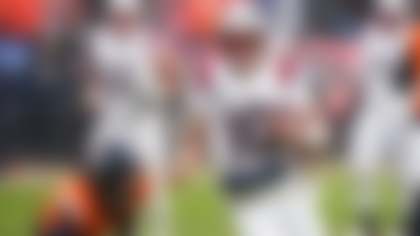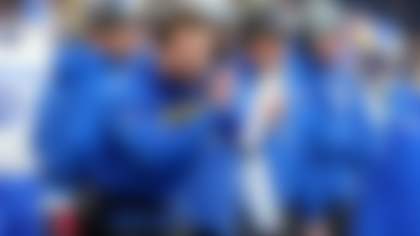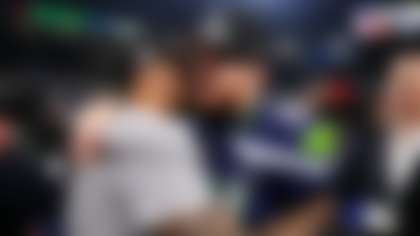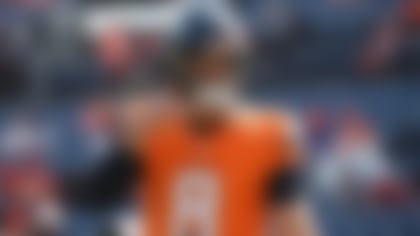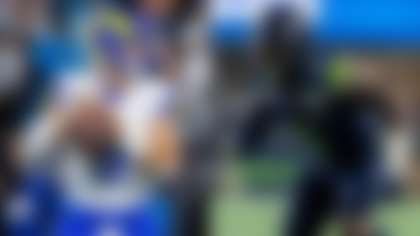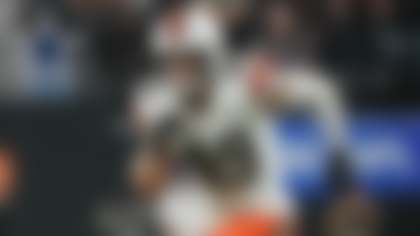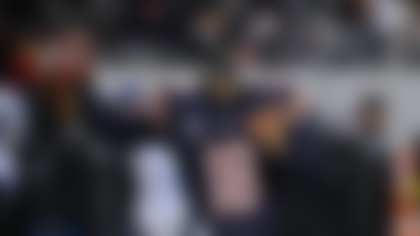Pete Carroll believes the story of the 2011 NFL season did indeed involve a burly, unconventional quarterback once recruited to the University of Florida by Urban Meyer, and later crowned the Heisman Trophy winner and a national champion.
The guy Carroll's describing, though, didn't hit the trade block this offseason. Nor will he any time soon.
You think Tim Tebow. Carroll thinks Cam Newton.
"He went into Auburn and had nothing (experience-wise) behind him, and did everything immediately," the Seattle Seahawks coach said of Newton, in what looked like genuine amazement. "He didn't emerge until the middle of the season, so we didn't know who he was. And then all of a sudden this was the top player in the country, a Heisman hopeful, and he just kills it. Then he goes to the NFL and does the same thing. He did the same thing! Nobody's ever done that.
"That's ... I don't know ... that's the biggest story in years."
Based on the freakish athleticism packed in Newton's 6-foot-5, 248-pound frame, no one was shocked that the Carolina Panthers rookie churned out 706 rushing yards. Similarly, it wasn't stunning that he broke the all-time record for touchdowns on the ground for a quarterback, with 14.
What was truly eye-opening -- what made folks like Carroll stand up and take notice -- was that Newton, panned as a raw passer in need of much seasoning going into the draft, threw for records as well. His 4,051 passing yards were 312 more than the rookie-record 3,739 Peyton Manning posted in 1998. Newton's completion percentage (60.0) also was better than Manning's (56.7), as was his yards-per-attempt (7.8-6.5).
Carroll credits the Panthers. He credits their coaches. And he and the rest of the league are bracing for what's ahead. Andrew Luck and Robert Griffin III are getting all the buzz now, with the draft just three weeks away. But the truth is, the future of the position may already be in the league, and Carolina has him in its colors.
"They checked it out. They figured it out. They went for it," Carroll said. "You gotta hand it to them. You guys watched (Mark) Sanchez. You saw how conservative (the Jets) were his first year with the throwing game. You basically think you don't put him in a situation where he's gonna screw it up, don't let him screw it up because he doesn't know what he's doing or he's unfamiliar. You go really careful with the guy. Well, they didn't do that."
Darlington: Opportunity knocks
As the Saints deal with bounty fallout, Jeff Darlington says the Bucs and Panthers could rise in the NFC South. **More ...**
Carroll kept coming back to ask just how the Panthers pulled it off. Ron Rivera addressed this with NFL.com in November, when the Carolina coach explained the divide between perception and reality on Newton. And now, Rivera reiterates that the Auburn offense Newton ran wasn't as simplistic as others thought. The real key was taking the training wheels off for a quarterback who was accustomed to constantly looking over to the sideline for calls.
Make him learn it, the thought went. And when he does, feed him more. Suffice it to say, the plan worked.
"One thing you notice with the kid: He doesn't have a wristband," Rivera explained. "That goes back to what Norv Turner does. His quarterbacks don't have wristbands. Philip Rivers does not have a wristband. And so we didn't give him one. (Offensive coordinator Rob Chudzinski) refused to. He said, 'If you give him one, it's a handicap.' ... They were forcing him to do things, with the different techniques they used coaching, to keep his focus."
Rivera wanted to create the best environment to assimilate Newton quickly. He consulted Atlanta Falcons coach Mike Smith about the handling of Matt Ryan, Rex Ryan about Sanchez, and also Steve Spagnuolo, who was a Rivera staffmate in Philadelphia when Donovan McNabb was a rookie, and who coached Sam Bradford a decade later. The ex-St. Louis Rams coach, now in New Orleans, emphasized getting everything right around the young quarterback.
Last offseason, the Panthers acquired veteran tight ends Jeremy Shockey and Greg Olsen to do just that. They retained DeAngelo Williams. They signed Geoff Hangartner to solidify the line. And then, they held off on signing a veteran quarterback, so the two young guys -- Newton and Jimmy Clausen -- could swallow up the practice reps. Spagnuolo wasn't set on starting Bradford, until A.J. Feeley was injured in 2010. Similarly, Rivera considered slow-playing it with Newton. But when he did step in, most of the pieces were in place around him.
Newton took it from there.
"It was about teaching the concepts, and then going to the next one," Rivera said. "It's what we do as a staff, and a lot of people do this. Again, whether it's offense or defense, you have to understand these concepts before you move on. It's not just about memorization."
The scary thing is what you have in Newton now is far from a finished product. When he left Auburn last year, his physical ability made his potential boundless. The trouble wasn't the things he couldn't do. It was the things that he simply hadn't done -- namely digesting a pro offense and commanding a huddle -- that made him something of a projection.
Now that we know Newton is capable? As one AFC executive says, "He's an athlete, he's got arm talent, mobility and offensive strategy from the coaches that plays to his strengths. He trusts his arm too much at times in decision-making, and his field vision could improve. But he has all the play-making ability you want."
And after last year, there's far less that doubt that Newton can, indeed, make up the difference with the shortcomings that remain in his game.
"They did so many things on offense," Carroll said of the Panthers. "He handled everything. And he came out of an (Auburn) offense where they told him what to do; he didn't even call a play. If you watched him in the early interviews, he couldn't even call a play -- 'Ok, give us your formation and basic play', he couldn't answer the question, because they signaled and everybody got it. He didn't say it. He didn't even have to huddle.
Reuter: NFC South draft needs
The Panthers and Bucs could rise in the NFC South, but both have holes to fill. Chad Reuter scouts draft needs. **More ...**
"And so for him to come that far is only trumped by the fact that he went to Auburn and had no spring football, and took over, and won every game and became the Heisman Trophy winner and scored 50 touchdowns."
Carroll, at one point, took a deep breath and said simply, "Look out for those guys now, holy mackerel. Look out, if he can just stay out there (healthy), they're gonna be a fantastic team."
And so while the stories of early 2012 may focus on another big, option-style signal caller (Tebow), or the latest bright prospects coming from the college ranks (Luck/Griffin), it's a good bet that by late 2012 the focus could shift to a guy who became as remarkable as an NFL player as he was unique as a prospect.
Follow Albert Breer on Twitter @AlbertBreer
